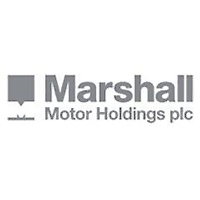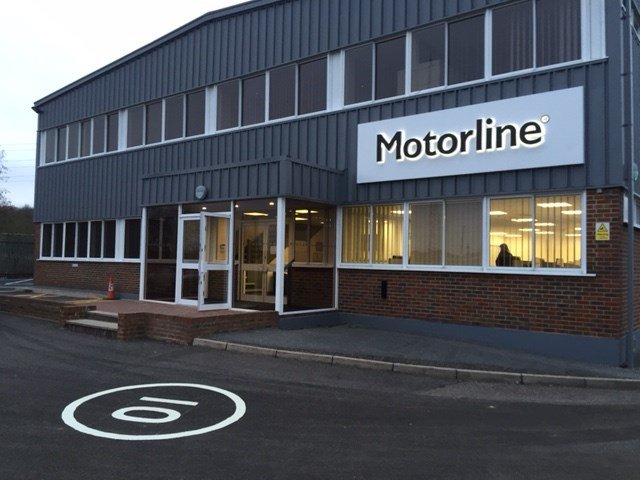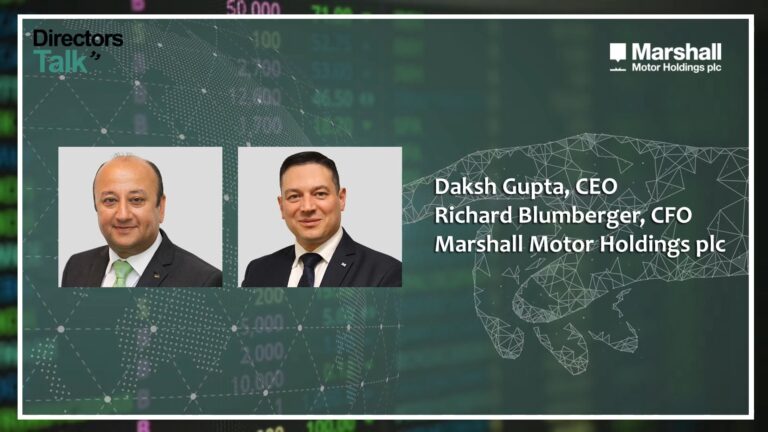Marshall Motor Holdings PLC (LON:MMH) Chief Executive Officer Daksh Gupta and Chief Financial Officer Richard Blumberger caught up with DirectorsTalk for an exclusive interview to discuss their final results, strong balance sheet and the outlook for 2019.
Q1: Marshall has delivered another record result in 2018, Daksh what are the key highlights of the year?
A1: Despite challenging market conditions, the group’s had an excellent year and I’m delighted to report that the group has delivered another set of record results, that’s four in a row since IPO.
The new and used car markets were down 6.8% and 2.1% respectively, with new in particular being affected by supply constraints due to the implementation of WLTP and the ongoing uncertainty surrounding diesel engines. This did impact premium brands in particular as they historically have a higher sales mix of diesel engines. Despite this market decline, we delivered like-for-like revenue growth and more than offset the decline in new with an outstanding used car performance. In addition, we enjoyed a good aftersales performance and managed to control our costs tightly.
All of that meant we’ve delivered a Profit before Tax at £25.7 million beating last year’s record result.
Finally, these results have further strengthened our balance sheet post the disposal of Marshall Leasing and this has given the Board confidence to increase our dividend to over 33% to 8.54p. So, overall, a fantastic results in a very difficult market.
Q2: Richard, what were they key drivers behind the exceptional 2018 result and your increased dividend?
A2: 2018 was indeed a strong year for us, despite the car markets. We saw like-for-like revenue increase by 1.2% with a really strong performance in our used car business where we saw revenue growth of 8.1% on the back of unit sales of 2.3%, all of this when the used car market declined by 2.3%.
It wasn’t just about revenue growth; our gross profit remains strong at 11.7% and we had clear focus and control over our cost base which remained flat for the year with disciplined one-off cost initiatives.
Our used car margin increased by 32 basis points and delivered an extra £7.5 million, this more than offset our new car performance in the year. What’s particularly pleasing for me is this shows the resilience in the portfolio and the business model we have.
As a result, our like-for-like return sales at the operating profit level was stable at 1.6% and we grew our underlying PBT by 1.2% to a record £25.7 million.
We’re in a great position with a strong balance sheet and cash generation which, when coupled with our stated strategy in growth, has given the Board the confidence to amend the dividend policy to 2.5-3.5 times underlying PBT cover. Therefore, the Board has proposed an increase of 50% in the final dividend to 6.39p which gives a 4-year dividend of 8.54p which is up by 33% year on year.
Q3: Daksh, you’ve recently announced 2 acquisitions, can you tell us a little bit more about them?
A3: On March 1st, we announced the completion of two separate acquisitions which we’re as a result of working in close partnership with our prime partner Skoda. These acquisitions are very much in line with our stated strategy of growth which is about growing scale with the right brands in the right markets and, wherever possible, extending our geographic footprint.
As a brand, Skoda has had phenomenal success in recent years and in 2018, they represented a 3.2% share in the UK and that’s up 13.1% over the last 5 years and in 2019, they’ll be launching two new models which will increase their brand coverage from 68% to 80%. So, we can expect to see further growth for the brand. In addition, Skoda being part of the Volkswagen Group will benefit from the €44 billion investment its making in electric cars and future mobility solutions.
For me, these acquisitions really are a textbook example of our strategy in action so just to give you a sense of that:
• In 2013, we entered the brand in Barnstaple as a result of the Silver Street acquisition
• In 2015 we added Croydon which came with the S.G. Smith acquisition
• Ridgeway added Newbury, Oxford and Reading
• Finally, 2 weeks ago, we announced the addition of six sites in Nottingham, Leicester, Northampton, Bedford, Letchworth and Harlow.
These five transactions added eleven sites, nine of which are contiguous making Marshall now the largest retailer UK for Skoda, whilst the latest acquisition, EPS dilutive, overtime will prove to be a great addition to the group and deliver a high return on capital employed for our shareholders.
Q4: Richard, you mentioned the strength of your balance sheet, could you talk us through this?
A4: So, the group has many strengths but one of the things I’m pleased to be inheriting as CFO is a very strong balance sheet.
Following the sale of the leasing business, we have minimal net debt, at the end of 2018 net debt was £5.1 million which is just 0.12 leverage cover. We have a strong asset base and our net assets have increased in the year around £9 million to around £200 million, this despite us having impaired some of our intangible assets by £9.3 million. This gives us net assets per share of £2.57 which is the highest it’s ever been. Our asset base is underpinned by freehold and long leaseholds which have increased in the year to £125.3 million.
We are a cash generative business, in cash generated by our operating activities stood at £45.5 million for 2018 which allowed us to invest £23.8 million in capital expenditure. So, not only do we have low net debt, we also have £120 million RCF which is committing until June 2021 which gives us adequate headroom to deliver on our strategy.
So, just turning to our capex, our 3-year £75 million programme, previously announced, is now complete. We expect to spend a similar level in 2019 to 2018 following our decision to retain the freehold on Lincoln Jaguar Land Rover rather than do a £10 million sale and leaseback. Our strong balance sheet has allowed us to make that decision, therefore, from 2020, we should see a significant reduction in our capital expenditure by the same amount.
Two other things I’d like to highlight, firstly is our impressive stock control, we have a very strict 56-day stock policy, and this allows us to focus on throughput and stock turn and we can see that this has supported a reduction in our like-for-like stock of 2.1%.
Secondly, it’s great that we have no defined benefit pension liability remaining and therefore have a very clean balance sheet and no debt exposure from this.
Q5: Richard, you joined as CFO a couple of months ago, what are your initial thoughts?
A5: So, first of all, I just want to say that I’m super excited to be the CFO of Marshall Motor Holdings PLC. I was really impressed with the track record of the business and the strength of the Board and management team which has delivered incredibly growth since IPO.
I talked already about our balance sheet being robust and that we’re a cash generative business and this is really key for me. It means we are in a unique and strong position to capitalise on any opportunity that present themselves and allows us to invest in growth, this is clearly evident by our early-2019 acquisitions of six Skoda dealerships.
One of my other earlier observations is that the group has a lot of talented and energic people, this is clearly as a result of our people-focussed culture. We’ve been recognised by having achieved ‘Great Place to Work’ status for the last 9 years and have been ranked in the ‘Best UK Workplaces’ for the last 4 years’ running.
We have a strong focus in technology, and we will look to invest further in 2019, we have an industry leading system in Phoenix 2 and really allows us to drive performance in central control whilst giving our frontline colleagues tools and freedom to do their jobs.
Just as a final thought, we are a resilient business, we’ve a great portfolio and franchise dealership approach, this allows us to be local and dynamic, we can respond to a challenging market and our customer’s needs in an efficient manner.
Q6: Finally, Daksh, what’s the outlook for 2019 and beyond for Marshall Motor Holdings?
A6: Despite market forecasts declining again, our order bank for March is encouraging and the quarter is in line with our expectations.
Beyond that, given the wider political and economic uncertainty, the Board believes it’s right to remain cautious, however the outlook for the full year remains unchanged.
Longer term, the market will continue to consolidate and it’s worth remembering that since 2008, the group has been one of the leading consolidators in the sector, the group has completed no fewer than 25 acquisitions or start-ups over that time, having bought and sold 146 businesses. So, our track record is excellent as you’ve also seen with today’s numbers.
With our people-focussed culture, our strong balance sheet and OEM relationships, I believe we are very well placed to growth further; however, we will only do so when it makes strategic and financial sense for our shareholders.








































